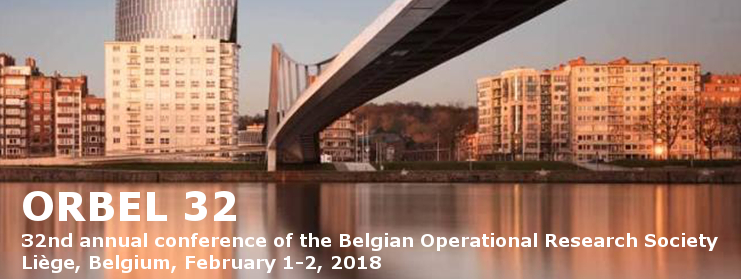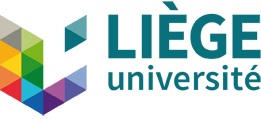 |
| |

|
|
| |
|
Schedule
Click on a link for more details
Show all the abstracts
Download the booklet of abtracts
Thursday 11:00 - 12:20 Routing Problems
Room 138 - Chair: Pieter Vansteenwegen
Thursday 11:00 - 12:20 Emergency operations scheduling
Room 130 - Chair: El-Houssaine Aghezzaf
Thursday 11:00 - 12:20 Algorithm design
Room 126 - Chair: Gerrit Janssens
Thursday 11:00 - 12:20 Multiple Objectives
Room 120 - Chair: Filip Van Utterbeeck
Thursday 13:30 - 14:50 Integrated logistics
Room 138 - Chair: Kris Braekers
Thursday 13:30 - 14:50 Person transportation
Room 130 - Chair: Célia Paquay
Thursday 13:30 - 14:50 Continuous models
Room 126 - Chair: Nicolas Gillis
Thursday 13:30 - 14:50 Integer programming
Room 120 - Chair: Bernard Fortz
Thursday 15:20 - 16:20 Material handling and warehousing 1
Room 138 - Chair: Greet Vanden Berghe
Thursday 15:20 - 16:20 Operations management
Room 130 - Chair: Roel Leus
Thursday 15:20 - 16:20 Matrix factorization
Room 126 - Chair: Pierre Kunsch
Thursday 16:30 - 17:10 Material handling and warehousing 2
Room 138 - Chair: Katrien Ramaekers
Thursday 16:30 - 17:10 Routing and local search
Room 130 - Chair: An Caris
Thursday 16:30 - 17:10 Traffic management
Room 126 - Chair: Joris Walraevens
Thursday 16:30 - 17:10 Pharmaceutical supply chains
Room 120 - Chair: Bart Smeulders
Friday 10:50 - 12:10 Optimization in health care
Room 138 - Chair: Jeroen Beliën
Friday 10:50 - 12:10 Network design
Room 130 - Chair: Jean-Sébastien Tancrez
Friday 10:50 - 12:10 Local search methodology
Room 126 - Chair: Patrick De Causmaecker
- Easily Building Complex Neighbourhoods With the Cross-Product Combinator
Fabian Germeau (CETIC)
Co-authors: Yoann Guyot, Gustavo Ospina, Renaud De Landtsheer, Christophe Ponsard
- Generic Support for Global Routing Constraint in Constraint-Based Local Search Frameworks
Renaud De Landtsheer (CETIC)
Co-authors: Quentin Meurisse
- Formalize neighbourhoods for local search using predicate logic
Tu San Pham (KU Leuven)
Co-authors: Jo Devriendt, Patrick De Causmaecker
Abstract:
Local search heuristics are powerful approaches to solve difficult combinatorial optimization problems and are particularly suitable for large size problems. However, local search approaches are often expressed in low-level concepts, which are not suitably formal to allow for modularity and reusability. Related to this issue, Swan et. al. point out the need of a pure-functional description of local search and metaheuristics. Lastly, Hooker opined in that “Since modelling is the master and computation the servant, no computational method should presume to have its own solver. [...] Exact
methods should evolve gracefully into inexact and heuristic methods as the problem scales up.”
The above issues inspire our work on formalizing local search heuristics, which should lead to modular, reusable and machine-interpretable formalizations of local search heuristics.
A local search heuristic consists of 3 layers: search strategy, neighbourhood moves and evaluation machinery. While the first and last layers are most likely problem independent, neighbourhood moves are usually problem-specific. Given a set of neighbourhoods moves, several local search heuristics can be created for a single problem.
Small changes in problem requirements are also easy to be taken into account without affecting most of the neighbourhoods and the general algorithms. Therefore, formalizing neighbourhood moves is the first step towards formalizing local search heuristics.
In this work, we formally describe neighbourhood moves and their corresponding move evaluations in FO(.), a rich extension of first-order logic, in which a problem’s constraints and objective function can also be formalized. We also extend IDP, an automated reasoning system , with built-in local search heuristics, e.g. first improvement search, best improvement search and local search, to obtain a framework that employs the modular neighbourhood formalizations to simulate a local search algorithm.
This framework is demonstrated by reusing the formalizations of three different optimization problems: the Travelling Salesman Problem, the assignment problem and the colouring violations problems. The numerical results show the feasibility of our work.
- What is the impact of a solution representation on metaheuristic performance?
Pieter Leyman (KU Leuven KULAK)
Co-authors: Patrick De Causmaecker
Friday 10:50 - 12:10 ORBEL Award
Room 120 - Chair: Frits Spieksma
Friday 13:00 - 14:00 Production and inventory management
Room 138 - Chair: Tony Wauters
Friday 13:00 - 14:00 Logistics 4.0
Room 130 - Chair: Thierry Pironet
Friday 13:00 - 14:00 Data clustering
Room 126 - Chair: Yves De Smet
Friday 13:00 - 14:00 Collective decision making
Room 120 - Chair: Bernard De Baets
Friday 14:10 - 15:10 Sport scheduling
Room 138 - Chair: Dries Goossens
Friday 14:10 - 15:10 Discrete choice modeling
Room 130 - Chair: Virginie Lurkin
Friday 14:10 - 15:10 Data classification
Room 126 - Chair: Ashwin Ittoo
|
|
| |
ORBEL - Conference chair: Prof. A. Arda -
Platform: Prof. M. Schyns.
|
|
 |
|





